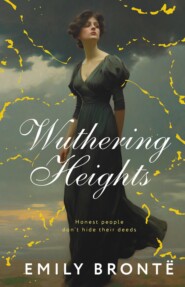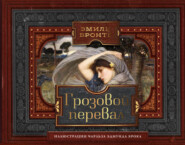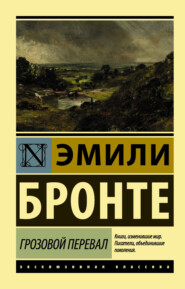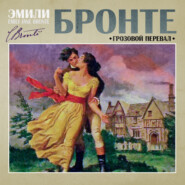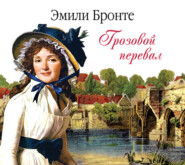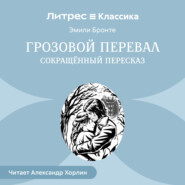По всем вопросам обращайтесь на: info@litportal.ru
(©) 2003-2024.
✖
Незнакомка из Уайлдфелл-Холла. Уровень 2 / The Tenant of Wildfell Hall
Настройки чтения
Размер шрифта
Высота строк
Поля
“Oh, no! But you will treat him like a girl – you'll spoil his spirit, and make a girl of him. I'll ask Mr. Millward to talk to you about it. I don't doubt, he'll be able to convince you in a minute.”
“No occasion to trouble the vicar,” said Mrs. Graham. “Anyway, it's time to go. Arthur!”
She slightly bowed, and was about to withdraw; but her son, with childish impertinence, exclaimed,
“Mamma, you have not shaken hands with Mr. Markham!”
She turned round and held out her hand. I gave it a spiteful squeeze.
Chapter IV
Our party, on the 5th of November, passed off very well, in spite of Mrs. Graham's refusal to grace it with her presence. My mother, as usual, was cheerful and chatty, full of activity and good-nature.
Mr. Millward told important dogmas and sententious jokes, pompous anecdotes and oracular discourses. Mrs. Markham, the polite Mr. Lawrence, the sedate Mary Millward, the quiet
Richard Wilson, and Robert listened to him very attentively.
Mrs. Wilson was more brilliant than ever, with her fresh news and old scandal, trivial questions and remarks. Her daughter Jane was, of course, as graceful and elegant, as witty and seductive. Here were all the ladies to outshine, and all the gentlemen to charm, – and Mr. Lawrence, especially, to capture and subdue.
Richard Wilson, Jane's younger brother, sat in a corner, silent and shy. Rose informed me that he favoured us with his company because of his sister Jane, who was anxious to show Mr. Lawrence that she had at least one brother more gentlemanly and refined than Robert.
Mary Millward was mute. She was rather sullen than diffident. Eliza told me she came because her father insisted upon it.
My Eliza was charming beyond description, coquettish without affectation, and desirous to engage my attention. She belied by saucy words and gestures.
Rose was simple and natural as usual, and full of mirth and vivacity. Fergus was impertinent and absurd. And finally (for I omit myself), Mr. Lawrence was gentlemanly and inoffensive to all, and polite to the vicar and the ladies, especially his hostess and her daughter, and Miss Wilson – a blind man! He had not the taste to prefer Eliza Millward. He seldom quitted the secluded place of his birth, where he lived in solitary state. I was the companion most agreeable to his taste. I liked the man well enough, but he was too cold, and shy, and self-contained, to obtain my cordial sympathies.
His heart was like a sensitive plant, that opens for a moment in the sunshine, but curls up and shrinks into itself at the slightest touch of the finger, or the lightest breath of wind. Our intimacy was rather a mutual predilection than a deep and solid friendship. Mr. Lawrence was like a new garment, all very neat and trim to look at, but very tight in the elbows.
Soon after the arrival of the guests, my mother mentioned Mrs. Graham. My mother regretted she was not there, and explained to the Millwards and Wilsons the reasons.
“She is a very strange lady, Mr. Lawrence,” added she; “we don't know what to think of her. But you can tell us something about her, for she is your tenant, you know. And she said she knew you a little.”
All eyes were turned to Mr. Lawrence.
“I, Mrs. Markham!” said he; “you are mistaken. I don't – that is – I have seen her, certainly; but I can't tell anything about Mrs. Graham.”
He then immediately turned to Rose, and asked her to favour the company with a song, or a tune on the piano.
“No,” said she, “you must ask Miss Wilson: she plays and sings much better.”
Miss Wilson demurred.
“She'll sing readily enough,” said Fergus, “if you stand by her, Mr. Lawrence, and turn over the leaves[9 - turn over the leaves – переворачивать ноты] for her.”
“I shall be most happy to do so, Miss Wilson; will you allow me?”
She bridled her long neck and smiled. After that she played and sang, one piece after another; while he stood patiently by, and turned over the leaves of her book.
“I don't take wine, Mrs. Markham,” said Mr. Millward; “I'll take a little of your home-brewed ale[10 - home-brewed ale – домашний эль]. I always prefer your home-brewed to anything else. There's nothing like this, Mrs. Markham!” said he. “I always maintain that there's nothing to compare with your home-brewed ale. These things are all blessings and mercies, if we only knew how to make use of them.”
“But Mrs. Graham doesn't think so. You'll just hear now what she told us the other day,” said my mother
And my mother favoured the company with a particular account of that lady's ideas,
“Now, don't you think it is wrong?”
“Wrong!” repeated the vicar, with more than common solemnity, “criminal, I say, criminal! She is making a fool of the boy, despising the gifts of Providence, and teaching him to trample them under his feet.”
Mr. Lawrence sat with his elbow on the table, and covertly smiled to himself.
“But don't you think, Mr. Millward,” suggested he, “that when a child may be naturally prone to intemperance – by the fault of its parents or ancestors, for instance – some precautions are advisable?” (Mr. Lawrence's father shortened his days by intemperance).
“Some precautions, it may be; but temperance, sir, is one thing, and abstinence another.”
“With some persons, temperance – that is, moderation – is almost impossible. A parent's authority cannot last for ever. Children are naturally prone to hanker after forbidden things. It seems to me, that this plan of Mrs. Graham's, as you describe it, Mrs. Markham, is not without its advantages.”
He pushed his chair a little away from the table, and leant back towards me – and carelessly asked me if I knew Mrs. Graham.
“I have met her once or twice,” I replied.
“What do you think of her?”
“I cannot say that I like her much. She is handsome, but not amiable. She too hard, too sharp, too bitter for my taste.”
He made no reply, but looked down and bit his lip.
After that we were dancing. Then I followed Eliza to help her with her shawl. And I snatched a kiss behind her father's back. But alas! I turned round, and there was my mother close beside me. When the guests departed, she said to me,
“My dear Gilbert, you know how I love you and prize you above everything else in the world. But how bitterly it will grieve me to see you married to that girl – or any other in the neighbourhood. What you see in her I don't know. There's neither beauty, nor cleverness, nor goodness, nor anything else in her. Wait awhile and see! If you bind yourself to her, you'll repent it all your lifetime.”
“Well, mother, do be quiet! I'm not going to marry yet, I tell you. But I want to enjoy myself.”
“Yes, my dear boy, but not in that way. Indeed, don't do such things. You'll get entangled in her snares before you know where you are. And if you marry her, Gilbert, you'll break my heart.”
“Well, don't cry about it, mother,” said I; “don't abuse Eliza anymore. I'll promise to think twice before I take any important step.”
I lighted my candle, and went to bed.
Chapter V
Soon I accompanied Rose her in a visit to Wildfell Hall. To our surprise, in a room we saw a painter's easel, with a table beside it covered with rolls of canvas, bottles of oil and varnish, palette, brushes, and paints.
“I must make you welcome to my studio,” said Mrs. Graham; “there is no fire in the sitting-room today, and it is very cold.”
She resumed her place beside the easel. It was a view of Wildfell Hall at early morning.
“I see your heart is in your work, Mrs. Graham,” observed I. “Our presence will interrupt, we shall regard ourselves as unwelcome intruders.”
“No occasion to trouble the vicar,” said Mrs. Graham. “Anyway, it's time to go. Arthur!”
She slightly bowed, and was about to withdraw; but her son, with childish impertinence, exclaimed,
“Mamma, you have not shaken hands with Mr. Markham!”
She turned round and held out her hand. I gave it a spiteful squeeze.
Chapter IV
Our party, on the 5th of November, passed off very well, in spite of Mrs. Graham's refusal to grace it with her presence. My mother, as usual, was cheerful and chatty, full of activity and good-nature.
Mr. Millward told important dogmas and sententious jokes, pompous anecdotes and oracular discourses. Mrs. Markham, the polite Mr. Lawrence, the sedate Mary Millward, the quiet
Richard Wilson, and Robert listened to him very attentively.
Mrs. Wilson was more brilliant than ever, with her fresh news and old scandal, trivial questions and remarks. Her daughter Jane was, of course, as graceful and elegant, as witty and seductive. Here were all the ladies to outshine, and all the gentlemen to charm, – and Mr. Lawrence, especially, to capture and subdue.
Richard Wilson, Jane's younger brother, sat in a corner, silent and shy. Rose informed me that he favoured us with his company because of his sister Jane, who was anxious to show Mr. Lawrence that she had at least one brother more gentlemanly and refined than Robert.
Mary Millward was mute. She was rather sullen than diffident. Eliza told me she came because her father insisted upon it.
My Eliza was charming beyond description, coquettish without affectation, and desirous to engage my attention. She belied by saucy words and gestures.
Rose was simple and natural as usual, and full of mirth and vivacity. Fergus was impertinent and absurd. And finally (for I omit myself), Mr. Lawrence was gentlemanly and inoffensive to all, and polite to the vicar and the ladies, especially his hostess and her daughter, and Miss Wilson – a blind man! He had not the taste to prefer Eliza Millward. He seldom quitted the secluded place of his birth, where he lived in solitary state. I was the companion most agreeable to his taste. I liked the man well enough, but he was too cold, and shy, and self-contained, to obtain my cordial sympathies.
His heart was like a sensitive plant, that opens for a moment in the sunshine, but curls up and shrinks into itself at the slightest touch of the finger, or the lightest breath of wind. Our intimacy was rather a mutual predilection than a deep and solid friendship. Mr. Lawrence was like a new garment, all very neat and trim to look at, but very tight in the elbows.
Soon after the arrival of the guests, my mother mentioned Mrs. Graham. My mother regretted she was not there, and explained to the Millwards and Wilsons the reasons.
“She is a very strange lady, Mr. Lawrence,” added she; “we don't know what to think of her. But you can tell us something about her, for she is your tenant, you know. And she said she knew you a little.”
All eyes were turned to Mr. Lawrence.
“I, Mrs. Markham!” said he; “you are mistaken. I don't – that is – I have seen her, certainly; but I can't tell anything about Mrs. Graham.”
He then immediately turned to Rose, and asked her to favour the company with a song, or a tune on the piano.
“No,” said she, “you must ask Miss Wilson: she plays and sings much better.”
Miss Wilson demurred.
“She'll sing readily enough,” said Fergus, “if you stand by her, Mr. Lawrence, and turn over the leaves[9 - turn over the leaves – переворачивать ноты] for her.”
“I shall be most happy to do so, Miss Wilson; will you allow me?”
She bridled her long neck and smiled. After that she played and sang, one piece after another; while he stood patiently by, and turned over the leaves of her book.
“I don't take wine, Mrs. Markham,” said Mr. Millward; “I'll take a little of your home-brewed ale[10 - home-brewed ale – домашний эль]. I always prefer your home-brewed to anything else. There's nothing like this, Mrs. Markham!” said he. “I always maintain that there's nothing to compare with your home-brewed ale. These things are all blessings and mercies, if we only knew how to make use of them.”
“But Mrs. Graham doesn't think so. You'll just hear now what she told us the other day,” said my mother
And my mother favoured the company with a particular account of that lady's ideas,
“Now, don't you think it is wrong?”
“Wrong!” repeated the vicar, with more than common solemnity, “criminal, I say, criminal! She is making a fool of the boy, despising the gifts of Providence, and teaching him to trample them under his feet.”
Mr. Lawrence sat with his elbow on the table, and covertly smiled to himself.
“But don't you think, Mr. Millward,” suggested he, “that when a child may be naturally prone to intemperance – by the fault of its parents or ancestors, for instance – some precautions are advisable?” (Mr. Lawrence's father shortened his days by intemperance).
“Some precautions, it may be; but temperance, sir, is one thing, and abstinence another.”
“With some persons, temperance – that is, moderation – is almost impossible. A parent's authority cannot last for ever. Children are naturally prone to hanker after forbidden things. It seems to me, that this plan of Mrs. Graham's, as you describe it, Mrs. Markham, is not without its advantages.”
He pushed his chair a little away from the table, and leant back towards me – and carelessly asked me if I knew Mrs. Graham.
“I have met her once or twice,” I replied.
“What do you think of her?”
“I cannot say that I like her much. She is handsome, but not amiable. She too hard, too sharp, too bitter for my taste.”
He made no reply, but looked down and bit his lip.
After that we were dancing. Then I followed Eliza to help her with her shawl. And I snatched a kiss behind her father's back. But alas! I turned round, and there was my mother close beside me. When the guests departed, she said to me,
“My dear Gilbert, you know how I love you and prize you above everything else in the world. But how bitterly it will grieve me to see you married to that girl – or any other in the neighbourhood. What you see in her I don't know. There's neither beauty, nor cleverness, nor goodness, nor anything else in her. Wait awhile and see! If you bind yourself to her, you'll repent it all your lifetime.”
“Well, mother, do be quiet! I'm not going to marry yet, I tell you. But I want to enjoy myself.”
“Yes, my dear boy, but not in that way. Indeed, don't do such things. You'll get entangled in her snares before you know where you are. And if you marry her, Gilbert, you'll break my heart.”
“Well, don't cry about it, mother,” said I; “don't abuse Eliza anymore. I'll promise to think twice before I take any important step.”
I lighted my candle, and went to bed.
Chapter V
Soon I accompanied Rose her in a visit to Wildfell Hall. To our surprise, in a room we saw a painter's easel, with a table beside it covered with rolls of canvas, bottles of oil and varnish, palette, brushes, and paints.
“I must make you welcome to my studio,” said Mrs. Graham; “there is no fire in the sitting-room today, and it is very cold.”
She resumed her place beside the easel. It was a view of Wildfell Hall at early morning.
“I see your heart is in your work, Mrs. Graham,” observed I. “Our presence will interrupt, we shall regard ourselves as unwelcome intruders.”






